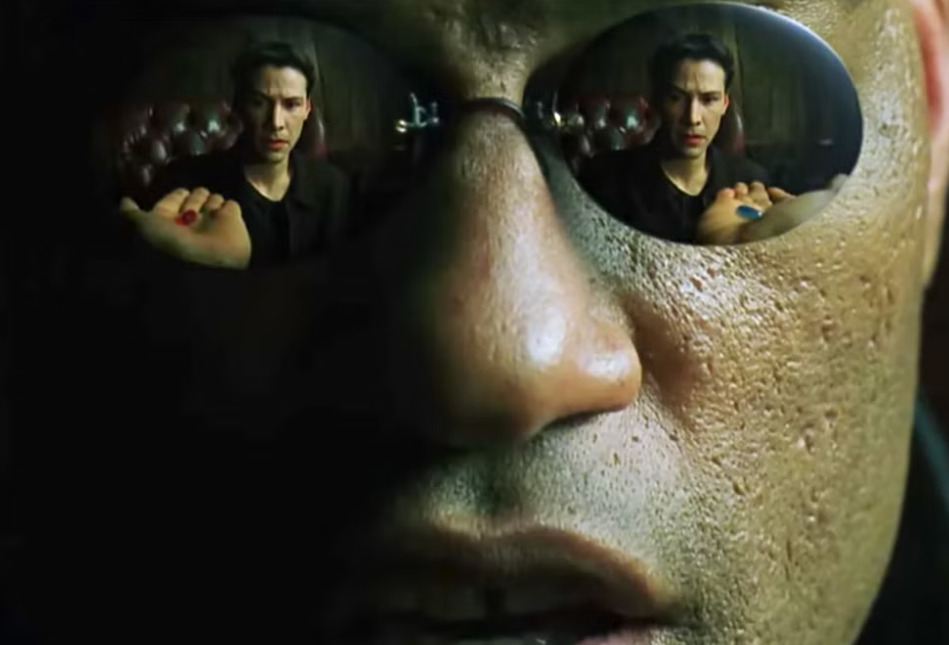
We’ve said too many times that nowadays, social networks have become an integral part of our daily lives: it’s now natural to contact an acquaintance with a WhatsApp message, post a souvenir photo on Instagram, or share our current thoughts with Facebook friends, dedicating a significant amount of our time in front of a screen.
Countless studies show the negative consequences of prolonged exposure to social media, and with the arrival of the metaverse, they could assume even greater proportions. For this reason, I decided to start with the film Matrix, a masterpiece that, already in 1999, not only depicted a dystopian future, anticipating the metaverse, but is also rich in metaphors and interpretations, quickly becoming a cult classic due to its impact on culture and the collective imagination. It is the product of the paranoia of the end of the millennium, mass hysteria, and fear of the future and new technologies: first and foremost, the Internet.
Thomas A. Anderson (Keanu Reeves) is an anonymous employee of an IT company, who spends his nights at the computer and is a celebrity among hackers with the nickname Neo.
Neo comes into contact with other hackers (or so-called hackers) who reveal to him that our reality is nothing more than a program generated by machines.
MORPHEUS: “The Matrix is everywhere, it’s all around us. Even now, in the room we’re in. It’s what you see when you look out the window, or when you turn on the television. You feel it when you go to work, when you go to church, when you pay your taxes. It’s the world that’s been put before your eyes to hide the truth. NEO: What truth? MORPHEUS: That you are a slave. Like everyone else, you were born in chains. You were born into a prison that has no bars, no walls, no smell. A prison, for your mind.”
The Matrix has generated an endless series of reflections in many fields and not only among science fiction fans.
The metaphor used explicitly in the film is that of Alice, Lewis Carroll’s character who, at the beginning of the novel “Alice’s Adventures in Wonderland,” tumbles down the rabbit hole and ends up in a world full of strangeness. Those adventures will mark Alice’s formation and her passage into adulthood. In The Matrix, Alice is Thomas Anderson, and by the end of the film, he too will no longer be the same: he will have completely transitioned into his identity as Neo. Thomas/Neo also follows a white rabbit, as suggested by a message that suddenly appears on his computer screen. Neo, whose name in the film’s world is Thomas Anderson, lives tormented by various questions about existence and reality, sensing, as happens to a select few, that something about his surroundings doesn’t add up.
MORPHEUS : “The Matrix is a system, Neo. And that system is our enemy. But when you’re inside it, you look around and what do you see? Businessmen, teachers, lawyers, carpenters… the mental projections of the people we want to save. But until we save them, these people are part of that system, and that makes them our enemies. You have to understand that most of them are not ready to be disconnected. Many of them are so addicted, so desperately dependent on the system, that they would fight to defend it.”
The Matrix is the virtual reality that is everywhere, around us.
Thomas Anderson is a man who constantly feels unsure whether he’s awake or dreaming. He leads a double life: on the one hand, he’s a computer programmer at a large company; on the other, he’s a hacker who goes by the name Neo and has committed numerous crimes. To understand the Matrix and shed light on his strange sensations, Neo must choose whether he wants to uncover a cruel truth. The choice lies between the red pill and the blue pill.
MORPHEUS “Blue pill, end of story: tomorrow you wake up in your room, and you can believe whatever you want. Red pill, you stay in Wonderland, and you’ll see how deep the rabbit hole goes. I’m offering you only the truth, remember. Nothing more.”
The film represents our life and is a brilliant, funny, disturbing film; in short, a metaphor for man’s subjugation to technology, to machines, to the fourth estate, to himself.
An action film, but deeply philosophical because it revisits some of the themes of ancient and modern philosophy. Let’s look at the philosophical aspects together.
It begins with Plato ‘s myth of the cave. The film revolves around the dichotomy between reality and fiction; Neo is the prisoner who leaves the cave to free himself from the illusions and pretenses it generates. Once he has accepted the harsh reality, he returns to the cave (in this case, the Matrix) to free others, as Morpheus did with him. The contrast between the Matrix (the sensible and perceived world) and the arid real world also recalls Arthur Schopenhauer’s veil of Maya , or representation, an illusory reality that hides the truth.
Artificial intelligences that cultivate and exploit human beings as energy sources for their own survival are like the Will, the blind impulse to live that deceives humanity, described by the German philosopher, who believes that liberation from pain requires exceptional people, geniuses and saints, in addition to art and compassion. In the Matrix, this exceptional person is Neo: man, friend, lover, hero, savior, who ultimately can accomplish extraordinary feats because he is fully self-aware.
And then there’s René Descartes and his cogito ergo sum . Neo, like Descartes, questions everything (am I awake or dreaming?), even his own existence, because, before being freed, his thoughts are within the world of the Matrix, existing only there. The Matrix is a narrative translation of metaphysical doubt; Neo is a thinking subject, and precisely for this reason his existence is not a simple one.
But we also find Soren Kierkegaard with the theme of choice and the connection between possibility and freedom, central to the philosopher’s thought, as throughout the film. Not only in the initial dilemma of choosing the red pill or the blue pill, but also when Neo must decide whether he is the Chosen One or not, and it is explained to him that only he can know. Neo then awakens from the deep sleep he has been immersed in and manages to free himself, escaping and breaking his chains. That sleep represents the common condition of us human beings, the dichotomy between reality and the virtual environment.
The fundamental message is one: the choice is always and only ours, as is emphasized in capital letters in a lapidary exchange between Morpheus and Neo, shortly before the latter discovers the truth about his existence.
MORPHEUS : “Do you believe in fate, Neo?
“NEO: “No.”
MORPHEUS: “Why not?”
NEO: “Because I don’t like the idea of not being able to manage my life.
Coming to awareness is always very difficult for us, so much so that we don’t understand what is real and what is a dream, but let’s remember that it’s not impossible!
Awareness is the first step and certainly the most important to be free and not a slave !
Being aware of who you are and what you do must be an ongoing process and, above all, must lead the individual to change their behavior. It is often synonymous with conscience.
To be aware means to be conscious, to be awake!
Very often we are not and in the morning before leaving the house we activate the so-called “autopilot” which leads us to not be vigilant.
We must therefore have greater awareness in our lives and let us never forget to also have greater IT awareness, since our data is a supreme asset that must be protected.
Cyber threats have escalated dramatically in recent years, and although cybersecurity has increasingly come to the attention of national and European regulators, there is still a lack of adequate awareness of cyber threats.
Everyone nowadays hears about cyber security but we must be aware, vigilant, and conscious of the risks deriving from the internet because as Morpheus says : “It’s one thing to know the right path, another thing to take it”
Let us always reflect on ourselves every day in the small and big things in life.
Stay tuned
Follow us on Google News to receive daily updates on cybersecurity. Contact us if you would like to report news, insights or content for publication.
